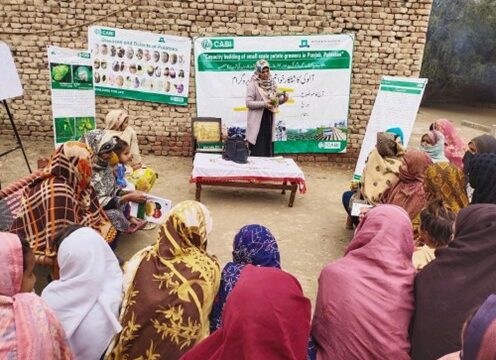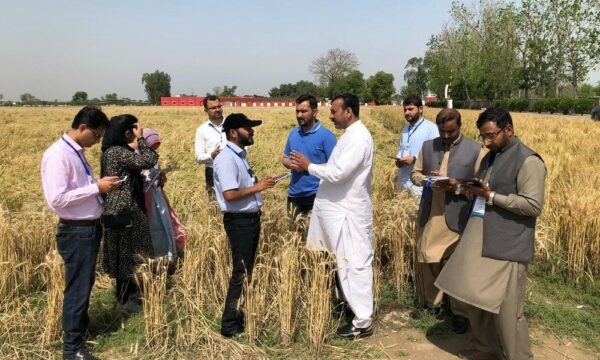
CABI and the Higher Education Commission (HEC) of Pakistan have signed a Letter of Intent (LoI) to collaborate on enhancing the quality of education and academic excellence within the domains of agriculture and biosciences.
The two organizations will work together for the integration of CABI’s knowledge resources – that are made available for free in Pakistan – into the curricula and library catalogues of the country’s higher education institutions.
They will also promote the CABI Academy’s free digital learning courses to learners in higher education, establish connections between CABI and pertinent agriculture universities and research centres, and carry out a needs assessment to identify skills and knowledge gaps for Pakistan.
Dr Babar Bajwa, CABI’s Senior Regional Director, Asia, and Prof Dr Zia Ul Qayyum, Executive Director HEC, officially signed the LOI which was witnessed by Awais Ahmed, Advisor HEC Global Engagement, and Hazrat Bilal, Director General HEC Research & Innovation Division.
Noshaba Awais, Director Research & Innovation, Noor Amna Malik, Managing Director National Academy of Higher Education (NAHE), and Dr Sabyan Faris Honey, CABI’s Deputy Director Business Development, were also in attendance along with senior officials from both organizations.
Prof Dr Zia Ul Qayyum emphasized the importance of HEC. He highlighted the impact that digital technology can have on education and is committed to harnessing its potential for the betterment of students, educators, and researchers – particularly in Pakistan’s agriculture sector.
“This collaboration aims to bridge the gap by translating academic research into practical solutions,” he said.
Dr Bajwa stressed that the impending partnership between CABI and HEC is poised to be a significant advancement for researchers in Pakistan.
Dr Bajwa said, “Through this collaboration, researchers will have unprecedented access to CABI’s distinguished digital platform, allowing them to publish their research on CABI’s esteemed publishing platforms.
“Access to CABI’s digital tools will also play a crucial role in bridging the gap between academic knowledge and real-world application in the agriculture sector.”
Additional information
Main image: Dr Babar Bajwa, CABI’s Senior Regional Director, Asia, (right) and Prof Dr Zia Ul Qayyum, Executive Director HEC, (left) sign the Letter of Intent.
About HEC
The Higher Education Commission (HEC) is a statutory body formed by the Government of Pakistan. Its primary responsibilities include accrediting academic degrees, developing new institutions, and uplifting existing institutions in Pakistan.
About CABI Digital Tools
CABI develops digital advisory tools that can help users make informed decisions. By providing farmers, practitioners, and policymakers with the tools to support evidence-based choices, we can support better responses to farming challenges. With easier access to rigorous scientific knowledge, end-users can respond more effectively to problems and take suitable preventative and proactive measures. We use a range of targeted digital channels to reach users and deliver insights that help improve decision making.
CABI’s digital development initiatives encompass the creation of various resources, including mobile apps, web services, and digital learning knowledge portals such as CABI Academy, CABI Compendium, open-access books, and CABI Journals. These resources play a vital role in aiding stakeholders in addressing complex challenges by providing a clear understanding of the science behind these issues and offering best-practice solutions.
To find out more about digital advisory tools, please visit our website https://www.cabi.org/products-and-services/
Author
Saqib Ali – Communication Officer
Related News & Blogs
Revolutionizing crop protection in Pakistan: Registration guidance approved to promote sustainable biopesticides
To celebrate the longstanding achievement in the crop protection sector of Pakistan, CABI organized a dialogue on ‘Regulatory Harmonization in Pakistan for Maximum Residue Limits and Biopesticides’ in Islamabad, Pakistan. The event saw the approval of…
14 February 2024




